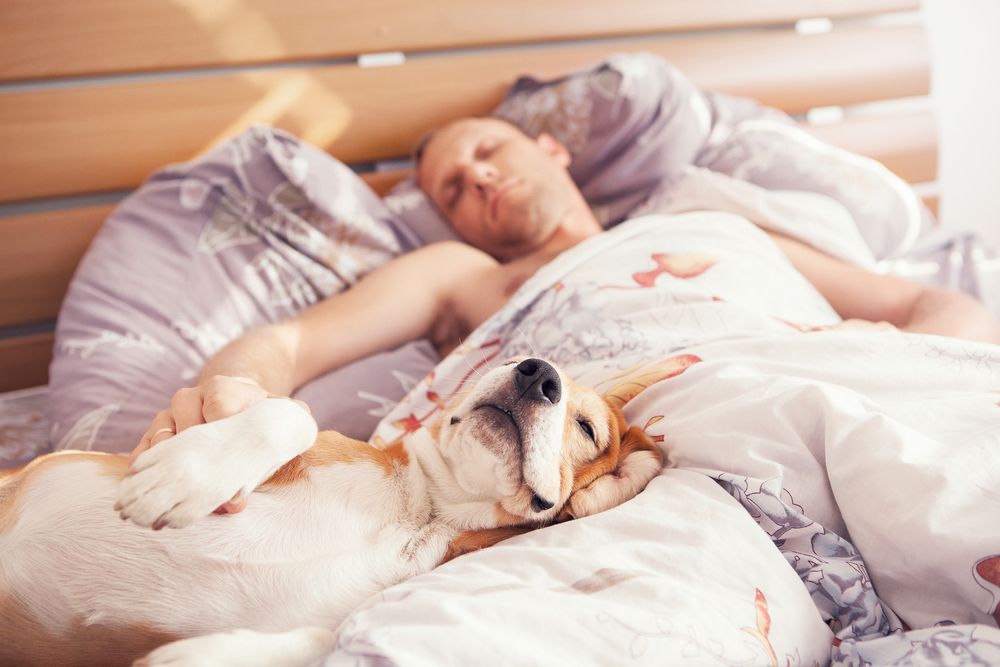Two thirds (66%) of UK pet owners are allowing their furry friends to sleep in or on their bed, and sleeping with your pet has been shown to have a positive impact on mental health.
Nearly a quarter (24%) of UK pet owners admitted to always letting their pet sleep in bed with them, while two in five (42%) said that they sometimes allow their furry friend to join them as a treat.
The research, by bed and mattress specialist, Bed SOS, found that men were less likely to allow pets to share the bedroom, with 36% saying that they never allow their pets into bed, compared to a third (33%) of women.
And spending more time with pets by sleeping with them can provide a major health boost. Here are five benefits of sleeping with your pet.
1. It can help ease stress and anxiety
Due to the close bonds humans form with their pets, it’s natural for owners to feel comforted and relaxed by the presence of their animal.
Sleeping in close proximity to a pet provides comfort and reassurance, which can help those suffering from disorders such as depression and anxiety, as well as easing feelings of stress.
2. It can mean a better night’s sleep
Many mental health problems can be linked to insomnia, so if you find that your pet has a positive effect on your mental health, then sleeping with them may help you get a better night’s sleep.
Close proximity to animals has also been proven to help people suffering from sleep disorders such as sleep apnea and nightmares, including those affected by post traumatic stress disorder (PTSD).
 3. It helps solidify bonds between you and your pet
3. It helps solidify bonds between you and your pet
Spending time with your pet will help to increase the bond between you, and sleeping with your pet increases the amount of time you spend with them, strengthening this bond even further.
This can also work with children, allowing your child to bond with your pet, as well as helping them to feel more secure when sleeping. However, make sure your child is responsible with the pet before allowing them to sleep together.
Read More: Pros and Cons of Letting Your Pet Sleep in Your Bed
4. It can make you feel more secure
Pets, especially dogs, are naturally light sleepers and remain alert when resting. For people concerned about security this can be a major benefit and can help to reassure the owner that they will be woken if the animal hears anything unusual.
5. It can decrease loneliness
A recent study found that 41% of pet owners said that sleeping with their pet provides feelings of companionship. This benefit can help combat loneliness and provide comfort among singles and those living alone, such as the elderly or those working away from home.
Whilst sleeping with your pets can provide health benefits, it is important to stop if it creates any issues for you.
If your pet is restless and is preventing you from having a good night’s sleep, begins to display signs of dominance or if it aggravates allergies then it’s best to stop allowing your pet into the bedroom.
Sarah Mackie, Writer and area co-ordinator at Pets as Therapy, said: “For those in relationships, sharing a bed with a larger pet can create extra challenges, but those sleeping alone could benefit from some animal company. Our primal need for the feeling of a safe place is often filled by a pet, whose steady heartbeat and lack of personal space provide the perfect conditions for calm.
“Whether sleeping with your pet is a good idea or not is a complex question”, Sarah continued: “A married couple sharing their bed with anything larger than a spaniel is, in my opinion, akin to sharing with a sprawling toddler – all bony bits and wriggling! However, for those people who might otherwise sleep alone, then an animal takes the place of a teddy and, as such, can aid a very restful sleep indeed.”
Danny Richmond, Managing Director of Bed SOS, said: “Pets hold a special place in our hearts, and for many people they provide much needed emotional support. If you’re struggling to sleep or feeling stressed at night, allowing your pet in your bed or even just the bedroom could have positive effects on your mental wellbeing, and lead to a better night’s sleep.”






